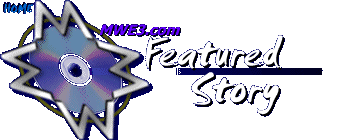Walking
On...
an interview with Steve Winwood
by Robert Silverstein
Mention the name Steve Winwood to ‘60s music fans and you’re
bound to get a wide range of memories. Some may altercate about Winwood
mainly being a keyboardist but let me tell you the first time I saw
him play live was Summer ‘69 at Madison Sq. Garden with Blind
Faith. When that slowly revolving stage in the center of the Garden
came around to my loge seats I was amazed at the unforgettable sight
of Winwood and Clapton trading white hot guitar licks and leads on
the intro of “Had To Cry Today”. Winwood not only continues
on to this day as one of the most gifted singer-songwriters of a generation,
but he’s also still an impressive guitarist by all accounts.
During the mid ‘60s he had huge hits as the front man of Spencer
Davis Group yet upon the formation of Traffic in 1967—with Jim
Capaldi, Chris Wood and Dave Mason—Winwood and company created
a new hybrid sound for rock music. Following the band’s mid ‘70s
breakup, Winwood kept the Traffic legacy alive with a series of solo
albums and huge video inspired hits during the late ‘70s, ‘80s
and early ‘90s. Long time Traffic fans still lamenting the untimely
passing of Jim Capaldi in January, 2005 won’t want to miss the
Epic Records DVD, The Last Great Traffic Jam. Captured live
during their ‘94 reunion, The Last Great Traffic Jam is
a well done rockumentary that shines a fresh light on the Traffic
legacy. Another noteworthy Winwood release is his 2005 Koch Vision
Soundstage DVD, featuring Steve and his current band with guitarist
Jose Neto. Steve’s new record label, Epic plans to follow The
Last Great Traffic Jam in early November 2005 with a dual
disc re-release of his 2003 album About Time. On September
8th, 2005 Steve spoke to Robert Silverstein about 2005’s The
Last Great Traffic Jam, the re-release of About Time, his
work on the Jose Neto CD Lua’s Dance and more.
Written and produced by Robert Silverstein, the
following is the full length version of an interview that originally
appeared in the November 2005 issue of 20th Century Guitar magazine.
SW: Hi Robert.
RS: Steve, good morning from New York City. It’s a bright sunny
day in New York.
SW: Oh, that’s good. We’ll be over there shortly I think.
RS: Are you in England?
SW: I’m in England, yeah.
RS: How’s London doing today?
SW: It’s doing okay but I’m not actually in London, but
it’s okay. The sun’s not shining but it’s very pleasant.
RS: I interviewed Jose Neto back in ‘03 when your group opened
for the Dead. And I met you after the show at the Beacon Theater in
2003, you probably don’t remember me.
SW: Yeah, maybe I do yeah.
RS: I want to ask you about this new Traffic archival DVD Epic Records
just sent me, The Last Great Traffic Jam. I’ve got say
it’s one of the best concert films I’ve ever seen.
SW: Have you seen it?
RS: Yeah.
SW: Oh great. Well thank you very much.
RS: You and Jim Capaldi are really excellent on that. It’s from
the ‘94 Traffic reunion tour. Why did it take so long for the
DVD video to come out?
SW: There was an awful lot of footage on that. About six months of
footage that we had to sift through. And then we were waiting to actually
do some kind of Traffic tour which, y’know Jim was all set to
do last year. No, this year. No, let me get this right. Last year.
We were all set to do it last October. Then he obviously called me
and said that he couldn’t do it. So we waited for a while to
see how things would pan out and I didn’t plan anything else
at all. I just waited to see how that would work out and of course,
the rest is kind of history.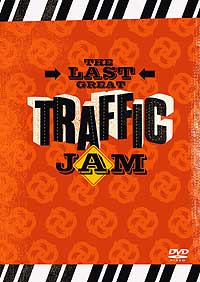
RS: Did Jim get to see the DVD?
SW: Oh yeah! He got to see it and loved it. Yeah.
RS: It was filmed in ‘94 so this is the first time it’s
seen the light of day in over ten years?
SW: That’s right.
RS: Who produced it and did all those great special effects?
SW: It was a fellow called Simon Vieler. He was the only man on this.
He shot the whole thing.
RS: The footage shown during “Walking In The Wind” is amazing
and there’s also footage from Woodstock ‘94?
SW: Yeah, that’s right. We also think it’s great and we’re
very proud of it.
RS: What was it like having Jerry Garcia guest on “Dear Mr. Fantasy”?
SW: Great. Fantastic. Jerry’s a great person and a great mentor.
I’ve known him and all the guys in The Dead for a long time.
It was great, fantastic. We had a great time. And they looked after
us really well when we toured, both times I’ve toured, opened
for them with Traffic. And then I toured with The Dead, with my band
two years ago I think it was. It was when you said you interviewed
Jose, I think.
RS: Yeah we interviewed him at the show between your set and then
you came back out and jammed with the Dead.
SW: Always when we’ve opened for them they’ve been very
accommodating.
RS: Anybody else you’d like to credit in the DVD? Walfredo Reyes,
the percussionist is on that too...he and Capaldi are hilarious in
some of those clips.
SW: Walfredo and then there’s Rosko Gee, plays bass. And of course,
Rosko was from an earlier chapter in Traffic, I think ‘72 / ’73.
I’m not sure of the dates exactly but I think it’s maybe
‘73 / ‘74. But Rosko played with us. He did When The
Eagle Flies album. This was the last studio Traffic album. And
then there’s a fellow called Mike McEvoy and of course Randall
Bramlett, who was working with me when I did those Dead shows. We
had a great time making that DVD.
RS: It’s going to be huge. There’s a real shortage of live
Traffic concert footage.
SW: There is...absolutely. We managed to track down a few bits and
pieces but yeah, there isn’t a lot of it available.
RS: Your guitar work on the DVD is great. People that don’t usually
associate you with the guitar right away are going to be in for a
surprise.
SW: Yeah, well you know this last album I did, the About Time record,
I didn’t play any guitar on the record at all. I just played
organ, or concentrated on the organ and doing the bass on the organ.
So, yes this Traffic is quite a different thing.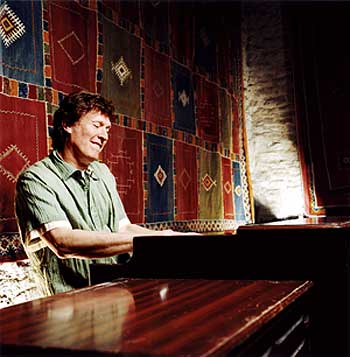
RS: I reviewed the Spencer Davis Group Live ‘66 video which MVD
sent me. That was with Spencer Davis Group in Finland? I know the
Finns love your music.
SW: You like Finland too?
RS: I’ve been there four times. I worked with a bass player from
Finland called Pekka Pohjola, who actually played me a tape where
he jammed with you and Mike Oldfield.
SW: What’s his name again?
RS: Pekka Pohjola.
SW: Oh, yes! I have played with Pekka, yes. Finland, yeah. It is a
great place. I suppose you went to the Pori jazz festival.
RS: Pekka was the bass player in Wigwam. I don’t know if you
ever heard them. They modeled themselves after Traffic in their early
years.
SW: I’ll have to dig them out and have a listen.
RS: Also there’s a recent DVD of the current band called Soundstage
on Koch.
SW: Yeah, that’s knocking around too now.
RS: I was also recently sent the Traffic Gold collection on
Universal Chronicles. Do you keep up on all the reissues Universal’s
been doing with Traffic?
SW: They don’t inform me about what they’re putting out.
RS: The double Traffic Gold CD features the cover with the
lineup with Dave Mason. Do you still keep in touch with Dave?
SW: Not so much. I saw him at the Rock And Roll Hall of Fame. When
was it...a year ago this past February.
RS: Is Epic your label now?
SW: That’s right, yeah.
RS: Are you still active with Wincraft as a label? A couple years
ago you said you were seeking the freedom of an independent label
and now you’re back on a major label. I hope Epic is going to
go your way.
SW: Well, that is true. You rather caught me out there and I was saying
that. This is a greater force for us to work on Wincraft. And Wincraft
is still going. This Epic deal is not a long, exclusive deal so it
means that I can still carry on in the future doing stuff with Wincraft.
It’s just really for specific projects, mainly the Traffic DVD
and a new studio album and some live stuff that I’m doing plus
some visual stuff as well. It’s not, as you say, an all-encompassing
deal. I’m still limited to work within the framework of Wincraft
Music.
RS: Also, isn’t Epic re-releasing your 2003 album About Time
as a dual-disc?
SW: That’s right. Because, although we were very happy and I
think it’s one of the best records I’ve made and I was very
happy about the results, I think there’s still lots of people,
who I speak to, who’ve never heard it. So part of the arrangement
with Epic was that they would re-release that, which is what they
wanted to do. Hopefully that will reach still more people.
RS: Sounds like a great idea. I heard there’s a live video on
the flip side.
SW: That’s right, yeah.
RS: Is that a complete concert?
SW: No, because I don’t think you can get that on a dual disc.
Correct me if I’m wrong but I think you only get 30 minutes of
visual and then one hour of music on a dual disc. As far as I know,
those are the limits on a dual disc.
RS: Putting video on the DVD side seems at this point a better offer
for most people who don’t have DVD audio.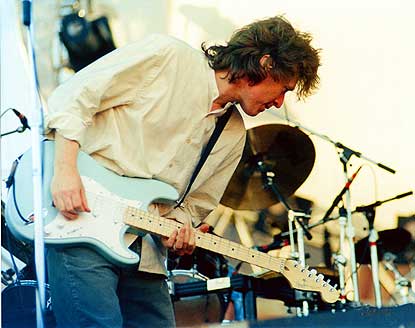
SW: I think it’s a great idea. Yeah, very good. Whether or not
it’s long lived or not, who knows? For the moment it’s a
great thing because for those people who just want to play the audio,
it’s got an hour of audio, so they can play that in their cars
or whatever, and then take the same disc and put it in their computer
or DVD and have thirty minutes of video. I think it’s a great
idea.
RS: Are you planning to go back and do dual discs on your other solo
albums and the Traffic stuff?
SW: I think they already are.
RS: Your 2005 concert tour is starting again in NYC on September 20th
at the Bowery Ballroom.
SW: I played there once before, yes.
RS: And then you’re also doing a show on October 10th at the
Nokia Theater. I never knew there was a Nokia Theater.
SW: It’s a new place I think, in Times Square, isn’t it?
We’re playing there, yeah.
RS: Is there an opening act? As long as you’re not the opening
act!
SW: No, absolutely not. Well actually, I like to think we do our own
opening act. We do kind of two sets. We play for about forty minutes.
The whole thing lasts about three hours.
RS: Besides you and Jose who’s in the band touring with you this
time?
SW: The drummer is a man called Davide Giovannini. He’s Italian
originally. He studied in Cuba and Brazil and he lives in London.
He’s on drums. Karl Van Den Bossche is playing percussion. He
also played on the About Time record. He was one of the percussionists
on the About Time record. And the horn player we have is a
man called Jay Davidson who I also met when I did the Funk Brothers
tour. I don’t know whether you’re aware of that but that
was a tour where all the Motown musicians played. I played with them
in Europe. I didn’t tour the States with them, but I toured with
them in Europe. And it was fantastic experience ‘cause I’ve
always been a big fan of those musicians and they are great people
and again they were very accommodating to me and welcoming and they
were really nice people. And fantastic musicians. And Jay was one
of the horn players on that, although he can also play keyboards and
harmonica and in fact, on that tour he was actually doing the Stevie
Wonder harmonica parts. He’s quite a flexible, adaptable musician.
RS: About Time is one of the great CDs of 2003. Parts of it
reminds me of the Spencer Davis Group sound...it has a real earthy,
R&B vibe. Was that the vibe you were going for?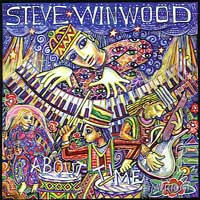
SW: Yeah...certainly. And I recorded it in much more of a traditional
way than I’ve done for many years. In other words, basically
all the musicians that played on it set up and we mic-ed them up and
they played, which sounds fairly obvious but of course a lot of records
aren’t made like that these days. There’s a lot of overdubbing
and things are done separately. We used no click tracks or loops or
anything like that. We just played live. And so...and I think because
of that it gave the whole record a kind of vibe. I also tried to combine
elements of World music as well on the record. So I wouldn’t
call it a completely R&B type record, the ‘60s. And also
I wanted to get that sound of the organ bass on it. So there’s
no bass player on the record. I played bass on the organ. And that
also certainly gives it a vintage sound I think.
RS: So Jose Neto plays all the guitars on About Time?
SW: That’s right, Jose plays all...I don’t play any
guitar. And in fact, that’s the first album I’ve put out
that I haven’t played guitar on.
RS: Jose is a great musician. What is it about his approach to the
guitar that interests you so much?
SW: I love the kind of background he has of Brazilian music. I love
that style of music. Although he has a background of playing that
music, he comes from San Paolo, he of course was influenced in the
‘60s by probably some of my contemporaries, you know, Jimmy Page
and Hendrix. And so, although he plays a nylon guitar as you know,
he uses all these effects and electrifies the guitar. And so I love
the way he combines rock with World music, that combination. He combines
rock music with Brazilian rhythms and Brazilian melodies and chord
changes. It’s just fascinating to me.
RS: How did you approach your role as producer on Jose’s new
solo CD with the Netoband? Can you say something about where and when
Lua’s Dance was recorded? It’s such a cool record.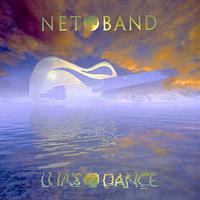
SW: Thank you very much. It was recorded in Gloucestershire, which
is where I live in England. It’s pretty much the same crew that
recorded the About Time record.
RS: They do sound like they compliment each other.
SW: Yes, I think so.
RS: What was your role as producer of the Netoband CD?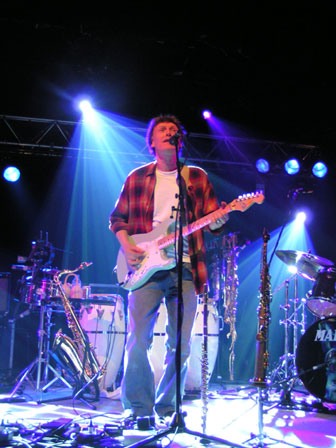
SW: Pre-production, looking for songs and again we wanted to do it
where the musicians set up and played everything live. So it was just
a question of overseeing the tape, making sure that things flowed
properly and that the compositions and the sequencing and all those
kind of things.
RS: One of my favorites from Jose’s CD is “Bahia”,
which sounds like a Jobim rock song and and song “Marta”.
SW: Yeah, and the other one I really love is called “Lua’s
Dance”, which is almost like a vintage Brazilian song. Yeah,
it’s great stuff.
RS: Can you say something about your custom Strat and which guitars
you’re using in concert these days?
SW: I’m playing the same one, yeah. It has gold, lace sensor
pickups on it. And I’m not too proud to use lock nuts either.
I just found another one. It’s got a neck that is not a custom,
it was a stock one. So I tried to get the same guitar and of course
the neck was completely different. So I had the measurements taken
from that neck. Low action, I use a .009 and a hybrid set of strings,
a medium pick...pretty mainstream really.
RS: Can you remember the first time you played a Strat?
SW: Oh, yeah. I think, in fact I think I had one of the first reissue
maple necks Strats, which I think was in 1966. I had a Tele and a
Strat, I think that was pre-CBS. They’d only been making rosewood
necks up until then and I think they just started reissuing the maple
necks and I had one then. Unfortunately, I don’t have that guitar
now. I think part of the problem of being a guitar player and a keyboard
player is that, in those days, bands had lots of thieves and you’d
put the guitar down to play the keyboard, you turn around and somebody
had stolen your guitar. It happened quite a bit.
RS: How about acoustic guitars?
SW: A Fender nylon, which I like very much. I have a Martin that I
used to try and write on but I haven’t used that for recording
or live for quite a long time now. And I use mandolin of course. I
use Washburn mandolins, which I like very much.
RS: What’s the first guitar you pick up at home?
SW: Interestingly enough, my nine year old daughter plays guitar,
so she has guitars lying around the house much more than I do. She
has a guitar, a Yamaha classical guitar that was mine, but now she
uses it and she plays it all the time. And I use the Strat. And I
use a vintage reproduction, which is also made by Washburn which I
got probably a good ten or twelve years ago. No, it was maybe fifteen
years ago. When I first had it, I didn’t used to like it at all.
It’s one of those small, vintage, kind of 1920’s style round
hole acoustics. A small body. I didn’t used to like that guitar.
It used to go out of tune and I didn’t like it at all. Now, it
seems to have just mellowed really nicely. It’s taken fifteen
years. Perhaps the wood’s got mellow. But now I really like it
as a guitar that’s lying around the house that you just pick
up and play.
RS: One more question? Jim Capaldi. What can I say, he was one of
the greatest rock drummers and songwriters of my generation. What
do you miss most about him?
SW: Well, I mean Traffic could never be without Jim Capaldi. He was
the man, he was the driving force, both rhythmically and with his
lyrics. And that is why, now, Traffic unfortunately has to live on
in DVD’s and there can’t be another Traffic for now because
Jim and I had a pact and an agreement that I wouldn’t create
Traffic without him and he wouldn’t create Traffic without me.
Thanks to Steve Winwood @ www.stevewinwood.com
- Jose Neto @ www.joseneto.com
-
Paul Minkkinen @ www.senzatempo.co.uk/html/col_rain.htm
and SonyBMG
